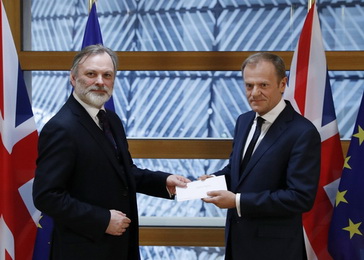 On 29 March, nine months after the Brexit vote, the United Kingdom initiated the historic process of leaving the EU, a union it joined 44 years ago, opening an expectedly complicated two-year negotiation process. The British ambassador to the EU, Tim Barrow, submitted a letter on initiating Brexit to the Chairman of the European Council Donald Tusk, signed last night by Prime Minister Theresa May.
On 29 March, nine months after the Brexit vote, the United Kingdom initiated the historic process of leaving the EU, a union it joined 44 years ago, opening an expectedly complicated two-year negotiation process. The British ambassador to the EU, Tim Barrow, submitted a letter on initiating Brexit to the Chairman of the European Council Donald Tusk, signed last night by Prime Minister Theresa May.
Britain’s invocation of Article 50 of the EU Treaty is considered to be a formal notice of intent on leaving the EU. The activation of this article initiated the two-year deadline for achieving an agreement on leaving the Union. Additionally, the two sides need to decide on future trade relations, but reaching an agreement on these issues is expected to last significantly longer.
Article 50 establishes the procedure for member states wishing to leave the EU. As stated by the European Parliament in a text explaining the process, the member wishing to leave the EU needs to invoke Article 50 “in accordance with their constitutional provisions”. Once activated, Article 50 provides for two years of negotiations, although the deadline can be extended by a unanimous decision of the European Council.
The agreement on leaving the EU will cover issues such as the rights of EU citizens in Britain, the rights of British citizens living in the EU, financial obligations undertaken by Britain as a member state, the issue of borders, particularly the one between Britain and the Republic of Ireland, the seats of EU agencies, as well as international obligations undertaken by Britain as a member state (e.g. as part of the Paris Accord in combating climate change).
Source: EurActiv.rs
 Government of the Republic of Serbia
Government of the Republic of Serbia














 pdf [271 KB]
pdf [271 KB]
Leave a Comment